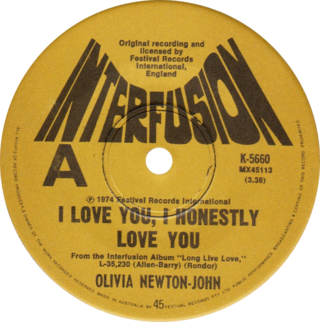
"I Honestly Love You" is a song recorded by Olivia Newton-John and released in 1974 on the album Long Live Love in the United Kingdom and If You Love Me, Let Me Know in the United States. The song became a worldwide pop hit, her first number-one single in the United States and Canada. The single was first released in Australia as "I Love You, I Honestly Love You", as per its chorus. The song was written by Jeff Barry and Australian singer and composer Peter Allen. The latter recorded it around the same time for his album Continental American.

"If" is a song written by American singer-songwriter David Gates in 1971. Originally popularized by his group Bread, "If" charted at No. 4 on the U.S. Billboard Hot 100 when released as a single in 1971 and No. 6 in Canada. It also spent three weeks at No. 1 on the U.S. Easy Listening chart, and one week at the top of the Canadian AC chart.

Clearly Love is the sixth studio album by Olivia Newton-John, released in September 1975.

"Help Me Make It Through the Night" is a country ballad written and composed by Kris Kristofferson and released on his 1970 album Kristofferson. It was covered later in 1970 by Sammi Smith, on the album Help Me Make It Through the Night. It has been covered since by many other artists from Tammy Wynette and Johnny Cash to Elvis Presley and Joan Baez.
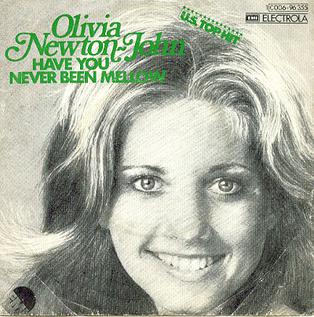
"Have You Never Been Mellow" is a song recorded by British-Australian singer Olivia Newton-John for her 1975 fifth studio album of the same name. Written and produced by John Farrar, the song was released as the lead single from the album in January 1975.
"Let It Shine" is a 1973 single written by Nashville songwriter Linda Hargrove.
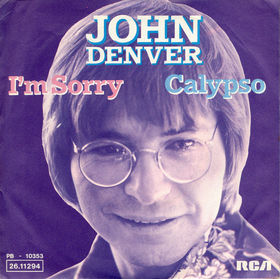
"I'm Sorry" is a song written and recorded by American country-folk singer-songwriter John Denver and released in 1975. It was the final number-one pop hit released during his career.

"Fly Away" is a 1975 song written and performed by John Denver featuring vocals by Olivia Newton-John. Released as a single from the Windsong album, "Fly Away" peaked at No.13 on the Billboard Hot 100 chart and spent two weeks atop the adult contemporary chart in early-1976, Denver's sixth No.1 on this chart. "Fly Away" also peaked at No.12 on the country chart.
"Looking for Space" is a popular song written and performed by the American singer-songwriter John Denver. Released as a single from his album Windsong, "Looking for Space" peaked at No. 29 on the Billboard Hot 100 in April 1976. On the easy listening chart, the song reached No. 1 to become his seventh to top that chart.
"What About Me?" is a 1984 song written by Kenny Rogers, producer David Foster, and singer-songwriter Richard Marx, and recorded by Rogers, Kim Carnes, and James Ingram as a trio song from Rogers' 1984 album of the same name. It was the lead single from the album and reached at number 15 on the US Billboard Hot 100 chart and at number one on the US Adult Contemporary chart, Marx's first number one hit as a songwriter.

"Please Mr. Please" is a song written by Bruce Welch and John Rostill, both members of British pop singer Cliff Richard's backing band, The Shadows. Welch had originally recorded the song himself in 1974 with no commercial success.
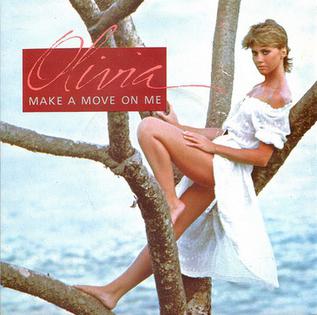
"Make a Move on Me" is a song recorded by singer Olivia Newton-John for her eleventh studio album. Physical (1981). It was written by John Farrar and Tom Snow, and produced by the former. The follow-up single to the number-one hit "Physical", it was released in January 1982 and peaked at number five on the US Billboard Hot 100 that April. It also became her twelfth and final single to be certified Gold by the Recording Industry Association of America (RIAA).
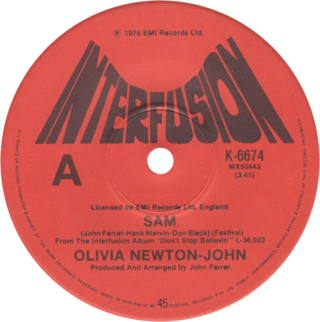
"Sam" is a song performed by Australian singer Olivia Newton-John. It was written by Don Black, Hank Marvin and John Farrar.

"If You Love Me (Let Me Know)" is a song written by John Rostill that was a 1974 hit single for Olivia Newton-John. It was her second release to hit the top 10 in the United States, reaching number 5 on the pop chart and number 2 on the Easy Listening chart. It also reached number 2 on the Billboard country chart. As with her single "Let Me Be There", Mike Sammes sings a bass harmony. It was nominated for the 1974 Country Music Association Award for Single of the Year.

"Hurt" is a 1954 song by Jimmie Crane and Al Jacobs. "Hurt" was originally performed by Roy Hamilton, whose version peaked at number eight on the R&B Best Seller chart and spent a total of seven weeks on the chart. A version by Ricky Denell also received considerable radio airplay in 1954 on pop radio stations. The song is considered to be the signature hit of Timi Yuro, whose version went to number four on the Billboard pop chart in 1961. Elvis Presley’s 1976 version reached the top 40 on the Billboard Hot 100 and the top 10 on Billboard’s Hot Country Singles chart. Juice Newton's 1985 version scored number one on Billboard's Country chart.
"Come On Over" is a ballad written by Barry and Robin Gibb and recorded by the Bee Gees for their album Main Course, with lead vocals by Robin, joined by Barry in the chorus.. A live version was recorded in Los Angeles during their Children of the World Tour and appeared on their first live album Here at Last...Bee Gees...Live. The song was more reminiscent of their older style as compared to the new R&B sound of "Jive Talkin'" and "Nights on Broadway". It would become a No.1 adult contemporary hit for Olivia Newton-John in 1976.

"Don't Stop Believin'" is the title track from the 1976 album by Olivia Newton-John. Written and composed specifically for Newton-John by John Farrar. It was released in August 1976 as the album's lead single. It peaked at number thirty-three on the Billboard Hot 100. It was her seventh number one on the Easy Listening chart, spending one week at the top of the chart in September 1976. The single also went to number fourteen on the country chart.
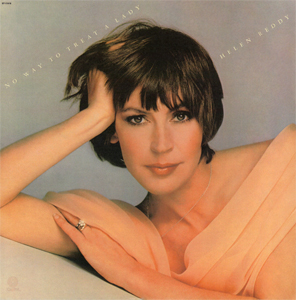
No Way to Treat a Lady is the seventh studio album by Australian-American pop singer Helen Reddy that was released in the summer of 1975 by Capitol Records and found Reddy tackling country pop, bossa nova and blues. The album debuted on Billboard's Top LP's & Tapes chart in the issue dated July 12, 1975, and peaked at number 11 over the course of 34 weeks, and on the album chart in Canada's RPM magazine it got as high as number 13. On January 19, 1976, the Recording Industry Association of America awarded the album with Gold certification for sales of 500,000 copies in the United States, and on August 23, 2005, it was released for the first time on compact disc as one of two albums on one CD, the other album being her 1976 release, Music, Music.

"Don't Throw It All Away" is a song written by British musician Gary Benson and first released by the Shadows on their 1975 album Specs Appeal. Benson released his version as a single later the same year, which reached number 20 on the UK Singles Chart in the fall of 1975.















